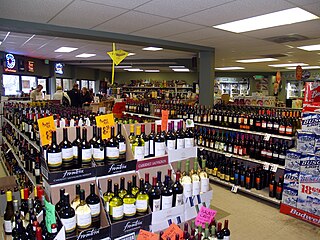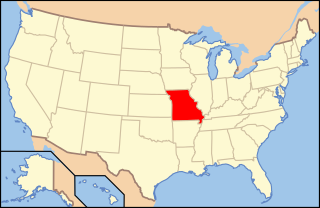
The Liquor Control Board of Ontario is a Crown corporation that retails and distributes alcoholic beverages throughout the Canadian province of Ontario. It is accountable to the Ministry of Finance. It was established in 1927 on the advice of Ontario Premier Howard Ferguson, to sell liquor, wine, and beer. Such sales had been banned outright in 1916; thus, the creation of the LCBO marked an easing of the province's temperance regime. By September 2017, the LCBO was operating 651 liquor stores.

20None
The Alcohol and Gaming Commission of Ontario (AGCO) is a provincial Crown agency that reports to the Ministry of the Attorney General.

A liquor store is a retail shop that predominantly sells prepackaged alcoholic beverages — typically in bottles — intended to be consumed off the store's premises. Depending on region and local idiom, they may also be called bottle store,off licence,bottle shop,bottle-o,package store,party store, ABC store,state store, or other similar terms. Many jurisdictions have an alcohol monopoly. Prices are usually substantially lower than in bars or pubs.

The Oregon Liquor Control Commission (OLCC) is a government agency of the U.S. state of Oregon. The OLCC was created by an act of the Oregon Legislative Assembly in 1933, days after the repeal of prohibition, as a means of providing control over the distribution, sales and consumption of alcoholic beverages. To this end, the agency was given the authority to regulate and license those who manufacture, sell or serve alcohol. Oregon is one of 18 alcoholic beverage control states that directly control the sales of alcoholic beverages in the United States. In 2014, the passage of Oregon Ballot Measure 91 (2014) legalized the recreational use of marijuana in Oregon and gave regulatory authority to the OLCC.
Alcoholic beverage control states, generally called control states, are 17 states in the United States that, as of 2016, have state monopoly over the wholesaling or retailing of some or all categories of alcoholic beverages, such as beer, wine, and distilled spirits.
The Ontario Temperance Act was a law passed in 1916 that led to the prohibition of alcohol in Ontario, Canada. When the Act was first enacted, the sale of alcohol was prohibited, but liquor could still be manufactured in the province or imported. Strong support for prohibition came from religious elements of society such as the Ontario Woman's Christian Temperance Union, seeking to eliminate what they considered the societal ills and vices associated with liquor consumption, including violent behaviour and familial abuse. Historically, prohibition advocates in Ontario drew inspiration from the temperance movements in Britain and the United States.
The Alcohol and Gaming Authority is an agency of the government of the Canadian province of Nova Scotia that regulates gambling and alcoholic beverages in the province.

Liquor Licence Board of Ontario was the regulatory agency responsible for issuing liquor permits and regulating the sale, service and consumption of beverage alcohol in Ontario to promote moderation and responsible use to establishment in Ontario. The agency was in operation from 1947 to 1998.
A liquor license is a permit to sell alcoholic beverages.
The prohibition of alcohol in Canada arose in various stages, from local municipal bans in the late 19th century, to provincial bans in the early 20th century, and national prohibition from 1918 to 1920. The relatively large and powerful beer and alcohol manufacturing sector, and the huge working class that purchased their products, failed to convince any of the governments to reverse their stance on prohibition. Most provinces repealed their bans in the 1920s, though alcohol was illegal in Prince Edward Island from 1901 to 1948. By comparison the temperance act in Ontario ran from 1916 to 1927.

The Nova Scotia Liquor Corporation (NSLC) is the Crown corporation which controls sales of alcoholic beverages and recreational cannabis in Nova Scotia, Canada. It is the sole distributor for these products and runs all retail outlets selling alcohol and cannabis products. The exceptions are for four private wine specialty shops and, in rural areas where there is not an NSLC location, 23 "agency" liquor stores operated by private retailers on NSLC's behalf.

The alcohol laws of Missouri are among the most permissive in the United States. Missouri is known throughout the Midwest for its largely laissez-faire approach to alcohol regulation, in sharp contrast to the very strict alcohol laws of some of its neighbors, like Kansas and Oklahoma.
The Alcohol and Gaming Division is a division of the New Mexico Regulation and Licensing Department. It administers the licensing provisions, while the Special Investigations Division of the Department of Public Safety enforces the provisions of the New Mexico Liquor Control Act. The Alcohol and Gaming Division processes applications for New Mexico Liquor Licenses, supervises the state’s Alcohol Server Training program, and adjudicates administrative citations for violation of the Liquor Control Act.
Alcohol laws of Australia are laws that regulate the sale and consumption of alcoholic beverages. The legal drinking age is 18 throughout Australia. The minimum age for the purchase of alcoholic products in Australia is 18. A licence is required to produce or sell alcohol.
The Victorian Commission for Gambling and Liquor Regulation (VCGLR) is the independent statutory authority that regulates the liquor and gambling industries in Victoria, Australia, including liquor and gaming licensing, compliance and education. It is also committed to minimising any potential harm the liquor and gambling industries may have on individuals and the community.
The alcohol licensing laws of Ireland regulate the sale and consumption of alcohol. The legislation controlling licensing regulations is the Intoxicating Liquor Act 2008, Intoxicating Liquor Act 2003, Intoxicating Liquor Act 2000, the Licensing Act 1872 and the Criminal Justice Act 1994. The International Agency for Research on Cancer, part of the World Health Organization, has classified alcohol as a class one carcinogenic.

The Michigan Liquor Control Commission is an agency of the U.S. state of Michigan, within the Michigan Department of Licensing and Regulatory Affairs (LARA), responsible for regulating the sale and distribution of liquor in the state.
In the Canadian province of Ontario, severe restrictions on the sale and consumption of alcoholic drink were imposed in localities during the later 19th century. Prohibition was imposed across the province under the 1916 Ontario Temperance Act, until restrictions were somewhat eased with the passage of the Liquor Control Act of 1927 which set up the still existing Liquor Control Board of Ontario. Regulations were further amended in 1934.